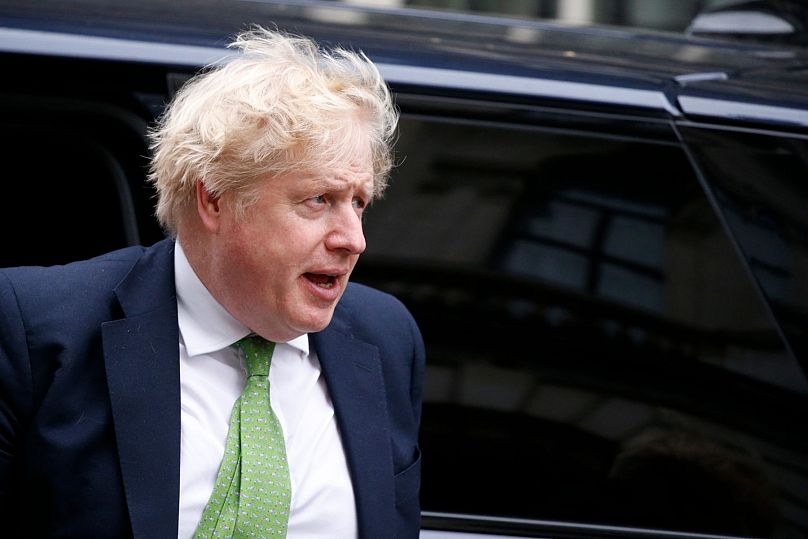As cost of energy continues to rise around the world, we explore just how far it's been impacted by Russia's war on Ukraine.
Warnings have been released that the UK cost of living could jump by as much as 10 per cent for the poorest families if Russia’s invasion of Ukraine leads to prolonged conflict.
 ADVERTISEMENT
ADVERTISEMENT
 ADVERTISEMENT
ADVERTISEMENT
Yearly gas and electric bills for the average household are set to rise to £1,971 (€2,353) in April, but are suspected to reach £3,000 (€3,582) in October.
As Rishi Sunak prepares his upcoming spring statement addressing the mounting pressures of the energy crisis, struggling families in UK prepare for even worse conditions than they are already experiencing.
"We are going to see a real increase in genuine poverty."
“I don’t know what to do,” a Cardiff mum, supported by Home-Start Cymru, told Euronews Green. “Prices keep rising and rising, but my pay isn’t. My bills have gone up so much. If it was just me, I’d put up with it, but it has been so cold for the kids. I’ve just had to pay and lose out on other areas like food shopping.”
As the war in Ukraine continues, the UK government has started subtly shifting the narrative to place blame on Russia for our energy crisis. Business secretary, Kwasi Kwarteng, said that the British people were ready and prepared to “endure hardships in solidarity with the heroic efforts that the people of Ukraine are making.”
Essentially, he suggested that the cost of living – particularly the price for energy - is due to the Russian invasion of Ukraine.
Martin Lewis, of Money Saving Expert, warned that this narrative shift takes any blame away from the UK government for the rising energy prices about to slam families throughout the country.
“We are seeing what may be potentially a deliberate narrative shift that effectively says the entire cost of living crisis is due to Ukraine and therefore we all need to make sacrifices and that is not correct,” he said in an interview on BBC Radio 4.
“We are going to see a real increase in genuine poverty in this country, millions of people being thrown into poverty. And the only way we can stop that is not by money-saving, and tightening our belts, it is by genuine political intervention.”
Is Lewis right in his accusations that the UK government is neglecting responsibility for the energy crisis and directing blame towards Putin’s Russia?
To what extent has the Russia-Ukraine war actually impacted energy prices?
“This war exposed the shortcomings on the UK over-reliance on the market,” Dr Roman Sidortsov, Senior Research Fellow in Energy Justice in the Science Policy Research Unit at the University of Sussex Business School.
“There are always going to be emergencies and disruptions. But you need to plan. Without planning and resilience measures, those disruptions are really going to hit.”
The last few years have been a perfect storm for an energy crisis. Even though Brexit had a slight impact on energy prices, it fell behind the huge impact of the pandemic.
“Brexit took the UK out of the energy planning process, but the pandemic was a bigger factor for driving prices up,” says Sidortsov.
When COVID-19 hit, companies curtailed energy production. Almost overnight, the world didn’t need as much natural gas and oil. And without the capacity to store extra, energy companies had to shut down production, costing huge amounts of money and time.
“Then there was a huge spike in demand when life restarted,” explains Sidortsov. “They had to reverse the curtailment of the production.” This was one of the huge reasons for the quick jump in prices. There was suddenly a spike in demand and production had to quickly be reinstated.
Energy prices would have jumped regardless of the Russian invasion of Ukraine, but the war exacerbated the situation.
“Russia is the largest exporter of natural gas and the second-largest exporter of oil,” says Sidortsov. All of a sudden, countries aren’t buying from Russia in opposition to their decision to invade Ukraine.
“The perfect storm has turned into a devastating hurricane, and I can say authoritatively that the UK could have done a much better job at carefully planning for the disruption.”
If the UK had utilised long-term storage for natural gases, had energy policies based on the climate agenda, been more aggressive with solar power implementation, and done more to electrify Britain, millions of Brits may have avoided the poverty they are about to experience due to the energy crisis.
The war in Ukraine will certainly worsen the crisis, but it can’t be blamed entirely. “We have a systemic problem with over-reliance on fossil fuel,” says Sidortsov. The options are to drill for more or focus on choosing to accelerate the energy transition.
“I do hope the UK government makes the right decision.”











